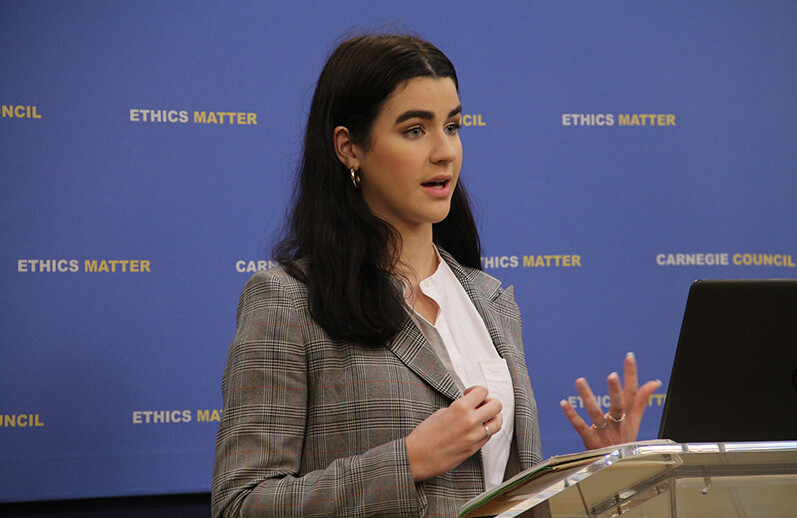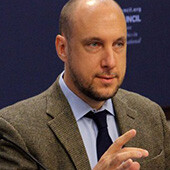On May 3, 2019, Josephine Marrocco's presentation on HIV/AIDS in Russia was selected as the winner of the Council's fifth annual Student Research Conference. Afterwards, Carnegie Council Senior Fellow Devin Stewart, who organized the conference, conducted this email interview with her about her research.
DEVIN STEWART: What was the topic of the research you presented at Carnegie Council?
JOSEPHINE MARROCCO: My research presented was my baccalaureate thesis, which focused on examining and analyzing the HIV/AIDS epidemic within the Russian Federation, and the reasons for which it continues to spread at alarming rates. While many developed countries have managed to control and maintain the spread of the HIV/AIDS crisis following the global peaks in the late 1900s and early 2000s, the United Nations estimates that in Eastern Europe alone, more than 80 percent of new diagnoses of HIV occur within Russia, with recent statistics suggesting a 35 percent rise year-over-year since 2010. My research operates both in the context of historical analysis and policy analysis, delineating a thorough account of AIDS within the Russian Federation and the various political and social institutions that continue to facilitate the proliferation of the disease. I also utilize two case studies of HIV/AIDS in Estonia and South Africa, as well as the international guidelines issued by the Joint United Nations Programme on HIV/AIDS to outline potential future policy measures for the Russian Federation.
DEVIN STEWART: Why did you select that topic?
JOSEPHINE MARROCCO: When applying for a resident visa to Russia, I was required to produce a negative HIV test; when researching the reasons for which HIV-positive foreigners are barred entry to Russia, I realized the extent of the epidemic within the country. Despite these alarming conditions, I saw almost no coverage within the United States about the growing HIV/AIDS problem in Russia. If the American government wishes to repair its diminishing relationship with the Kremlin, it needs to start with addressing the direct needs of the Russian people. Not only is AIDS in Russia a humanitarian issue, it is teetering on the border of a political crisis. The Russian population suffering from AIDS is deserving of understanding and empathy, but most importantly, immediate attention. For these reasons, as well as my own academic interests in comparative politics and international policy analysis, I decided to dedicate my baccalaureate thesis to HIV/AIDS in Russia.
DEVIN STEWART: What was the process of doing the research?
JOSEPHINE MARROCCO: My research was limited to a 35 to 40 year time span (from the late 1970s until present day) and included a plethora of sources. For my own work and writing, I drew on sources from a variety of fields: academic and historical writings, official governmental and NGO reports, official legal and religious documents as well as conducting my own research regarding the efficacy of the Russian healthcare system. Therefore, I maintained my analysis and findings not on personal opinion, but rather well-established trends, figures, and first-hand accounts of the issues relating to HIV/AIDS within Russia.
DEVIN STEWART: What were your findings?
JOSEPHINE MARROCCO: My findings essentially uncovered that a combination of political propaganda, lack of unified government strategy, as well as restrictions of international methods and cooperation all negatively exacerbate the HIV/AIDS epidemic in the Russian Federation. Although there has been some progress in Russia, policy toward AIDS is alarmingly underdeveloped, particularly relative to other nations. There is a growing wave of pressure on the Kremlin as more "mainstream" Russian citizens, those who are not members of the stereotypical at-risk populations, become infected and are seeking treatment and care that is scarce to find. While the social implications of the epidemic are significant, AIDS also represents a serious political and economic threat to the core of the country's national security. AIDS in Russia is dangerously close to a national political crisis; faced with a dwindling population and struggling economy, discriminatory laws, and mandatory conscription, Russia cannot afford to lose such a large portion of the country to HIV/AIDS, especially when there are proven prevention methods already utilized with great success by other countries.
When we consider the international implications of this crisis, the United States and every other country that wishes for a stable Russian Federation has a strong reason to be concerned about Russia's AIDS epidemic. Through active progressive policies, which have been proven effective in many other countries, the AIDS epidemic can be managed and stabilized within Russia. However, if Russian leaders continue to behave with the same close-minded, far-sighted logic, thousands will die needlessly and a serious political threat may emerge.
DEVIN STEWART: Tell me about what you plan to do in the future regarding this research.
JOSEPHINE MARROCCO: I explicitly state within my research that, considering Russia's current "State Strategy and Implementation Plan on HIV" policy will end in 2020, I would like to reexamine my research in the future, or potentially expand upon it further for my Master's thesis. An abridged version of my research is currently in the process of being published within Fordham University's Research Journal (FURJ), as well as the full text to be included in Fordham's online library catalog.
DEVIN STEWART: What were your impressions of the Carnegie Council student conference?
JOSEPHINE MARROCCO: The student conference was a truly unique and thought-provoking event; it was amazing to hear and discuss extremely high-levels of research from numerous disciplines and schools across the country, and to have the chance to network a bit with such intelligent and capable peers. I strongly encourage any student to apply!



